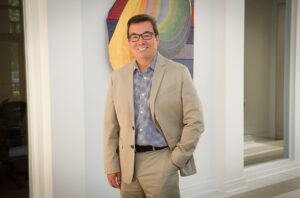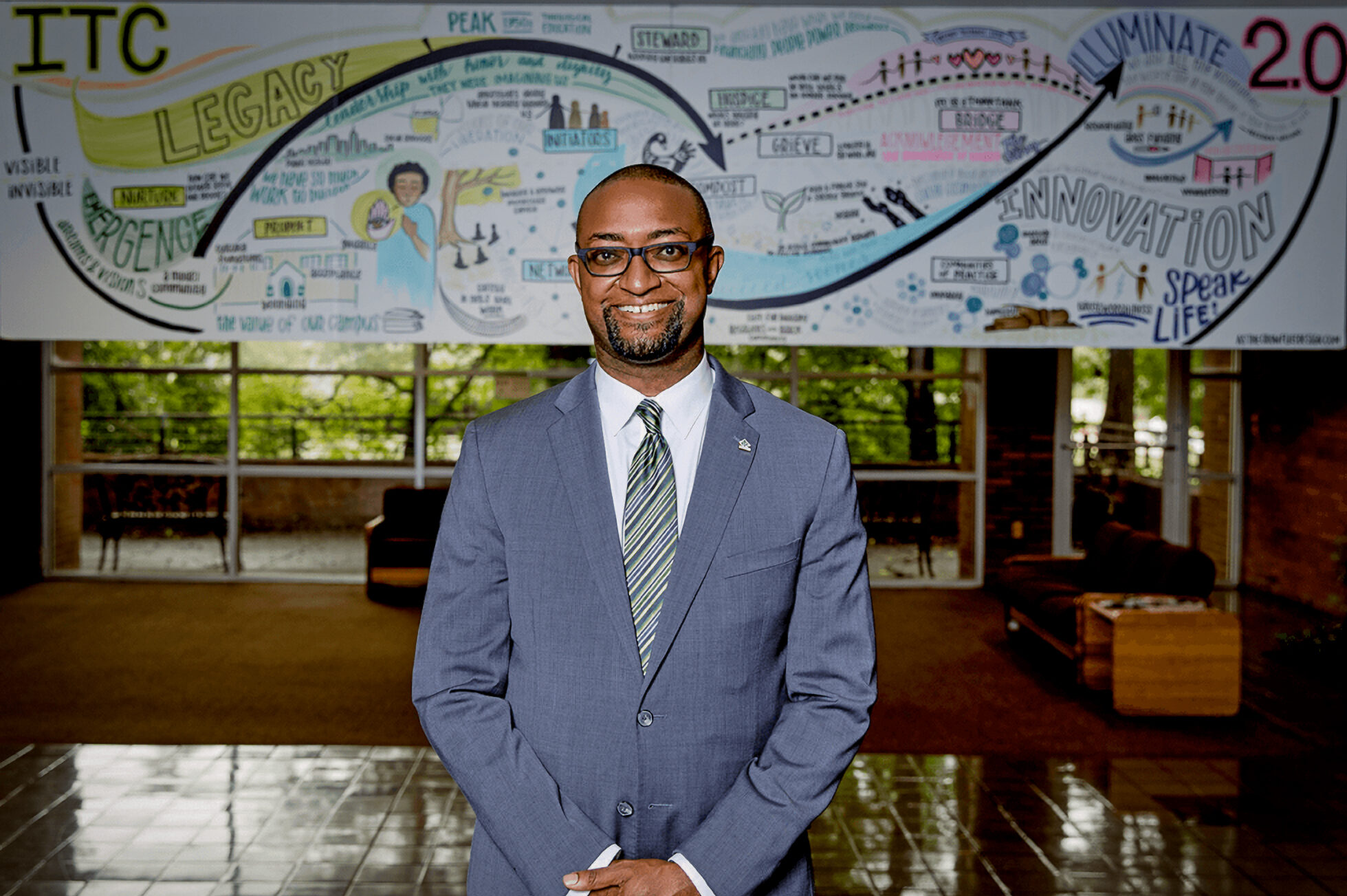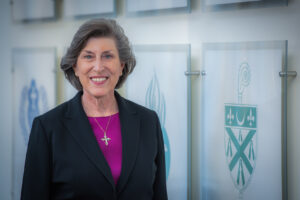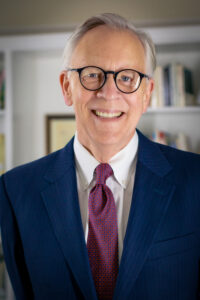Initiative Provides Resources for Theology Schools Seeking New Pathways
2021 Annual Report:
Today’s pastoral students are more diverse and preparing to minister to congregations with modern-day challenges.
“What has typically happened in theological education, in response to changing dynamics, is to reflexively change curriculum, look at our faculty, redesign classes,” Williams says. “Those are technical fixes when what is really needed is a change in institutional thinking. We have been thinking of symptoms, not systems.” —Matthew Wesley Williams, Interdenominational Theological Center
In 2021, Lilly Endowment approved 84 grants of $500,000 to $1 million each to theological schools across the United States and Canada in the second phase of its Pathways for Tomorrow Initiative. This three-phase initiative is designed to help theological schools strengthen and sustain their capacities to prepare and support pastoral leaders for Christian congregations.
 Theological schools have long played a central role in preparing pastors for Christian congregations, according to Frank M. Yamada (right), executive director of the Association of Theological Schools (ATS). Today, these schools are facing significant challenges, due in great part to changes affecting both higher education and Christianity in North America.
Theological schools have long played a central role in preparing pastors for Christian congregations, according to Frank M. Yamada (right), executive director of the Association of Theological Schools (ATS). Today, these schools are facing significant challenges, due in great part to changes affecting both higher education and Christianity in North America.
The Endowment launched Pathways to assist theological schools in responding to these changes. Through an initial phase of assessment and planning grants, the Endowment invited theological schools to explore emerging challenges, gain clarity about their missions, assess educational strategies and financial operations, and design plans to become more educationally effective and financially viable for the future. The second phase grants are enabling selected schools to implement their plans.
Like most higher education institutions, theological schools are adapting to new delivery methods, including distance education, as they strive to recruit and serve new generations of students.
“The 21st century student is different in every way,” Yamada says.
He describes the typical 20th century theological student as a young white male raised in his parents’ Christian denomination. After college he enrolled in a seminary of that denomination and went on to serve a congregation of the same denomination.
Theological students today are from far more diverse backgrounds. They are often older, don’t live in seminary campus housing, and chances are they’re working and raising families while attending classes. They may already be serving congregations, but perhaps not in the denominations in which they were raised. They’re looking for affordability and flexibility.
The congregations these aspiring pastors will serve are changing, too. Many seminarians will serve churches in increasingly diverse contexts, which require a wider range of skills and competencies.
In response, theological schools are re-envisioning strategies to make educational programs more accessible and more relevant to emerging leadership challenges. Schools also are working to strengthen fundraising capacities to improve long-term financial stability and help make their programs more affordable for students.
“The Pathways initiative couldn’t have come at a better time,” Yamada says. “Schools were already contemplating how to rethink their strategy while continuing to fulfill their mission.”
New Wineskins
The Pathways initiative was especially timely for Interdenominational Theological Center (ITC), a historically Black ecumenical graduate school in Atlanta. In 2020, under the leadership of Matthew Wesley Williams (ITC ‘04), ITC initiated a process of institutional innovation, and in 2021 the Endowment awarded ITC a $1 million grant through Phase 2 of the Pathways initiative.
The ground has shifted for religious institutions, and it’s time to question long-held assumptions about what it means to be an expression of the gospel in the world today, Williams (below) says.

“What has typically happened in theological education, in response to changing dynamics, is to reflexively change curriculum, look at our faculty, redesign classes,” Williams says. “Those are technical fixes when what is really needed is a change in institutional thinking. We have been thinking of symptoms, not systems.”
The Endowment grant is helping ITC reimagine its entire approach. The seminary is exploring innovation in its educational model, institutional design, organizational assessment and governance. The goal: sustainably prepare pastoral leaders for viable vocations in the pulpit, parish, and public life, which ultimately strengthen the social impact of the Black church. ITC, Williams says, seeks to cultivate a new generation of “prophetic problem solvers” who build the capacity of Black congregations and communities to co-create alternatives to the status quo.
“The Pathways initiative enables theological schools space to ask the questions that matter, not just about leaders they produce, but also what it requires of the institution to cultivate the kind of leaders our congregations and communities need now,” Williams says. “Without new institutional imagination and design, anything we do at the academic and program level is just old wine in new wineskins.”
Co-Creating the Church of Tomorrow
Catholic Theological Union (CTU), a Roman Catholic graduate school of theology and ministry in Chicago, received a $997,000 grant to launch its plan, Pathway for Tomorrow: Co-creating the Church of Tomorrow.
 CTU President Sr. Barbara Reid (left), OP, a member of the Dominican Sisters of Grand Rapids, Mich., says the school is committed to increasing the number of young adult ministers for the Catholic Church. In doing so, CTU is responding to new realities and emerging needs in the Church—including the need for more lay ecclesial ministers who will work with ordained priests and deacons in parishes.
CTU President Sr. Barbara Reid (left), OP, a member of the Dominican Sisters of Grand Rapids, Mich., says the school is committed to increasing the number of young adult ministers for the Catholic Church. In doing so, CTU is responding to new realities and emerging needs in the Church—including the need for more lay ecclesial ministers who will work with ordained priests and deacons in parishes.
Funding is helping the school engage more young adults from diverse backgrounds who are considering lay or ordained ministry and create a “living-learning community” that will be central to their theological and ministerial formation.
Research CTU conducted as the school prepared its Pathways grant proposal indicated that young people want to be part of organizations and activities that are openly welcoming, empathetic and accepting, and that foster connections.
With that in mind, CTU has several goals for its Pathways Initiative grant. They include creating a focused appeal to young adults from Latino/Hispanic, Black, Asian American/Pacific Islander, and LGBTQ+ communities and building the living-learning community to nurture faith formation and help students recognize the connection between religion, discipleship and social change.
CTU also is taking deliberate steps to ensure that formation, coursework, and community life are integrated around preparing lay and ordained ministers to engage in more collaborative ministries that are inclusive and responsive to a changing world.
“Pope Francis has emphasized that every person is entrusted with the responsibility of being a missionary disciple,” Reid says. “As the student experience is transformed, so too is the face of the Church as these missionary disciples go out to minister around the world.”
Responding to the Changing Leadership Needs of Churches
Fuller Theological Seminary is using a $1 million Pathways grant to launch the Indispensable Church Leadership Project. Located in Southern California, the nondenominational evangelical seminary created the project to make its degree and certificate programs more affordable for aspiring and current students; to strengthen its course offerings by developing and testing new interdisciplinary curricula for ministerial candidates; and to reach more ministerial candidates and pastoral leaders through a stronger approach to digital learning.
 “These new approaches are important as Fuller seeks to be responsive and creative during this exceptionally turbulent and daunting season in higher education, in theological education, in the Church, and in contexts everywhere,” says the Rev. Dr. Mark Labberton (right), president at Fuller.
“These new approaches are important as Fuller seeks to be responsive and creative during this exceptionally turbulent and daunting season in higher education, in theological education, in the Church, and in contexts everywhere,” says the Rev. Dr. Mark Labberton (right), president at Fuller.
Pastors, he says, need formation that is flexible and responsive to the times even while being rooted in the wisdom of Christian faith and tradition.
“We are not presuming people will serve within the reliable structures and predictable roles of the past. No one knows the models of the Church of the future,” Labberton says. “However, we trust the God of that future. In addition to embodied faith, we know that our graduates will require authenticity, courage, vulnerability and resilience, amidst everroiling change.”
Up Next: Collaboration
In Phase 3 of Pathways, the Endowment invited theological schools to submit concept papers for large-scale, collaborative projects that provide compelling and sustainable models for theological education. Selected schools were invited to submit full proposals for grants of up to $5 million to fund projects that offer the potential to be replicated at other theological schools. The Endowment anticipates announcing Phase 3 grants in 2022.
Grants made in 2021 to theological schools across the United States and Canada through phases 1 and 2 of this initiative included 234 planning grants awarded for up to $50,000 each, 84 implementation grants ranging from $500,000 to $1 million each for supporting programs and grants of $5,567,000 and $1,350,800 to fund two coordination programs for the initiative.

